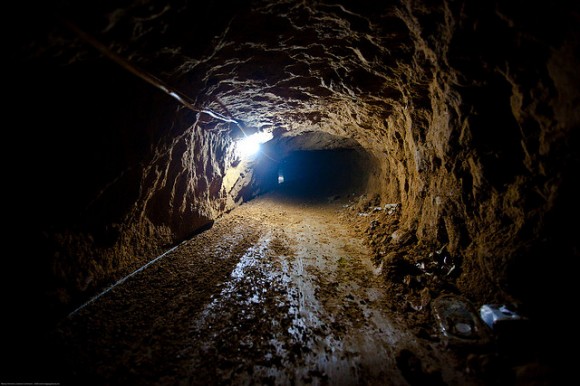
The furor over the recent chemical weapons attack in Syria has overshadowed disturbing events to the south, as Egypt’s generals wage a quiet war of attrition against the Hamas leadership in Gaza.
Hamas has found itself increasingly isolated, politically and geographically, since the Egyptian army ousted the country’s first democratically elected president, Mohammed Morsi, in early July.
Hamas is paying the price for its close ties to Egypt’s Muslim Brotherhood, the Islamic movement that briefly took power through the ballot box following the revolutionary protests that toppled dictator Hosni Mubarak in 2011.
Since the army launched its coup three months ago, jailing the Brotherhood’s leadership and last week outlawing the movement’s activities and freezing its assets, Hamas has become a convenient scapegoat for all signs of unrest.
Hamas is blamed for the rise of militant Islamic groups in the Sinai, many drawn from disgruntled local Bedouin tribes, which have been attacking soldiers, government institutions and shipping through the Suez canal. The army claims a third of the Islamists it has killed in recent operations originated from Gaza.
At an army press conference last month, several Palestinians “confessed” to smuggling arms from Gaza into Sinai, while an Egyptian commander, Ahmed Mohammed Ali, accused Hamas of “targeting the Egyptian army through ambushes.”
The Egyptian media have even tied Hamas to a car bombing in Cairo last month which nearly claimed the life of the new interior minister, Mohammed Ibrahim.
Lurking in the shadows is the army’s fear that, should the suppressed Muslim Brotherhood choose the path of violence, it may find a useful ally in a strong Hamas.
A crackdown on the Palestinian Islamic movement has been all but inevitable, and on a scale even Mr Mubarak would have shrunk from. The Egyptian army has intensified the blockade along Egypt’s single short border with Gaza, replicating that imposed by Israel along the other three.
Over the past weeks, the army has destroyed hundreds of tunnels through which Palestinians smuggle fuel and other necessities in short supply because of Israel’s siege.
Egypt has bulldozed homes on its side to establish a “buffer zone”, as Israel did inside Gaza a decade ago when it still occupied the enclave directly, to prevent more tunnels being dug.
That has plunged Gaza’s population into hardship, and dealt a harsh blow to the tax revenues Hamas raises on the tunnel trade. Unemployment is rocketing and severe fuel shortages mean even longer power cuts.
Similarly, Gaza’s border crossing with Egypt at Rafah – the only access to the outside for most students, medical patients and business people – is now rarely opened, even to the Hamas leadership.
And the Egyptian navy has been hounding Palestinians trying to fish off Gaza’s coast, in a zone already tightly delimited by Israel. Egypt has been firing at boats and arresting crews close to its territorial waters, citing security.
Fittingly, a recent cartoon in a Hamas newspaper showed Gaza squeezed between pincers – one arm Israel, the other Egypt. Sami Abu Zuhri, a Hamas spokesperson, was recently quoted saying Egypt was “trying to outmatch the Israelis in tormenting and starving our people”.
Hamas is short of regional allies. Its leader Khaled Meshal fled his Syrian base early in the civil war, alienating Iran in the process. Other recent supporters, such as Turkey and Qatar, are also keeping their distance.
Hamas fears mounting discontent in Gaza, and particularly a demonstration planned for November modelled on this summer’s mass protests in Egypt that helped to bring down Morsi and the Muslim Brotherhood.
Hamas’ political rival, Fatah – and the Palestinian Authority, based in the West Bank – are reported to be behind the new protest movement.
The prolonged efforts by Fatah and Hamas to strike a unity deal are now a distant memory. In late August the PA annnounced it would soon be taking “painful decisions” about Hamas, assumed to be a reference to declaring it a “rogue entity” and thereby cutting off funding.
The PA sees in Hamas’ isolation and its own renewed ties to the Egyptian leadership a chance to take back Gaza.
As ever, Israel is far from an innocent bystander.
After the unsettling period of Muslim Brotherhood rule, the Egyptian and Israeli armies – their strategic interests always closely aligned – have restored security cooperation. According to media reports, Israel even lobbied Washington following the July coup to ensure Egypt continued to receive generous US aid handouts – as with Israel, mostly in the form of military assistance.
Israel has turned a blind eye to Egypt pouring troops, as well as tanks and helicopters, into Sinai in violation of the 1979 peace treaty. Israel would rather Egypt mop up the Islamist threat on their shared doorstep.
The destruction of the tunnels, meanwhile, has sealed off the main conduit by which Hamas armed itself against future Israeli attacks.
Israel is also delighted to see Fatah and Hamas sapping their energies in manoeuvring against each other. Political unity would have strengthened the Palestinians’ case with the international community; divided, they can be easily played off against the other.
That cynical game is in full swing. A week ago Israel agreed for the first time in six years to allow building materials into Gaza for private construction, and to let in more fuel. A newly approved pipe will double the water supply to Gaza.
These measures are designed to bolster the PA’s image in Gaza, as payback for returning to the current futile negotiations, and undermine support for Hamas.
With Egypt joining the blockade, Israel now has much firmer control over what goes in and out, allowing it to punish Hamas while improving its image abroad by being generous with “humanitarian” items for the wider population.
Gaza is dependent again on Israel’s good favor. But even Israeli analysts admit the situation is far from stable. Sooner or later, something must give. And Hamas may not be the only ones caught in the storm.


/That cynical game is in full swing. A week ago Israel agreed for the first time in six years to allow building materials into Gaza for private construction, and to let in more fuel. A newly approved pipe will double the water supply to Gaza./
We block supplies and it’s called a brutal siege on innocent people.
We allow those same supplies and it’s called a cynical game.
Dude make up your mind.
I certainly hope one day those egyptian generals will pay heavily for their treacherous action against their arab brothers.
This is the problem of the ME, each group, tribe, religious community, nationality, etc. fight eachother, instead of concentrating their power on outside enemies, and they certainly have a few. The hegemony of Eretz Israel, the new colonial intentions of France and GB, and above all, the empire building by the USA, just to name the most important ones.
Did the arabs unite, they could be one of the greatest powers on this globe and that is exactly what the west and Israel want to avoid at all costs.
If you look at it strategically these are the new trends – leading to some sort of stability. Hamas is a kind of outlier even in the Palestinian context – its staunch stance to never recognize Israel cannot be part of workable program for some kind of arrangement and its general violent attitude, past terror adherence and the use of rockets against civilians in Israel (AFTER Israel quit there) disqualifies it from being a part of that. The PA is emerging as the sole representative of the Palestinian side, supported by the main existing Arab forces, Egypt, Saudi Arabia and Jordan as well as good contacts with the West while Hamas past allies, Syria and Iran are crumbling or at least on a constant decline. The PA alos enjoys a reasonable level of realtioship with Isreal. So what we see are the phases of an ongoing process of regional consolidation where the trouble makers: Saddam, Assad. Hamas and soon Hezbollah too are withering away (together with a constantly declining Iran`s “resistance axis” including the downsizing of Iran itself) – it`s all History in the making.
Here we have the usual Jonathan Cook agitprop.
For the first half of the article, Cook sticks to the facts, explaining Egypt’s quarrel with Hamas.
Than Cook casually drops Israel into a sentence.
Then in another paragraph Cook drops in Israel again, and then slowly he steers the his readers away from the Egypt-Hamas quarrel and toward the Israeli boogeyman, which Cook created.
Then, of course, it’s Israel, Israel, Israel until the article’s anti-Isreal conclusion.
A hackneyed magic act.
“Than Cook casually drops Israel into a sentence.”
Nothing casual about it. The cause of the Egypt/Gaza conflict is the fact that the Egyptian generals decision to bed the israeli whore.
“toward the Israeli boogeyman, which Cook created.”
No, the devil, israel, is quite real and commits its evil every single day on the people of Gaza. No discussion of the hell the Gazans are forced to endure would be complete without discussing the party primarily responsible for that pain: the zionists and their abomination of a state.